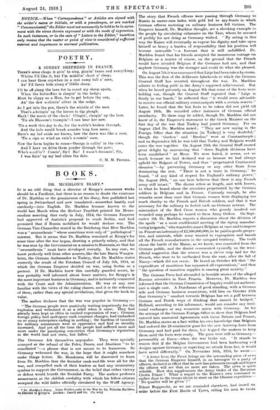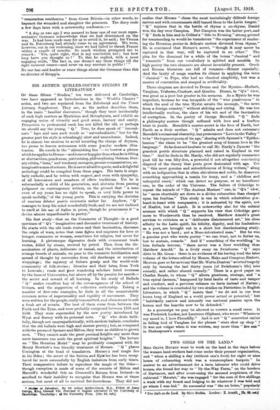BOOKS.
DR. MUEHLON'S DIARY.•
Is is an odd thing that a director of Krupp's armament works should be a Pacificist, but there is no reason to doubt the existence of Dr. Muehlon or the genuineness of his diary, first published last spring in Switzerland and now translated—somewhat hastily and carelessly—into English. Dr. Muehlon became known to the world last March when the Berliner Tageblatt printed his Memo- randum asserting that early in July, 1914, the German Emperor had approved of Austria's proposal to crush Serbia, and had promised that if Russia mobilized he would declare war. The German Vice-Chancellor stated in the Reichstag that Herr Muehlon was a" neurasthenic " whose assertions were only of " pathological " interest. But it seems that Dr. Muehlon remained at Krupp's for some time after the war began, drawing a princely salary, and that he was sent by the Government on a mission to Rumania, so that his " neurasthenia " must have developed recently. In any case, we know perfectly well from other sources, like the late Baron Wangen heim, the German Ambassador to Turkey, that Dr. Muehlon states correctly the result of the Potsdam Council of July 5th, 1914, at which the German Emperor decided on war, using Serbia as a pretext. If Dr. Mirehlon knew this carefully guarded secret, he was probably well informed about lesser matters, for Krupp's is- the most important business in Germany, and is intimately connected with the Court and the Administration. He was at any rate familiar with the views of the ruling classes, and it is the reflection of these, rather than any special revelations, that gives the book its value..
The author declares that the war was popular in Germany:—
"The German people were positively waiting impatiently for the explosion and welcomed it as a relief when it came. They had already been kept so often in excited expectation of war ; German foreign policy had undergone such constant changes, had embarked on so many enterprises ending in nothing ; the burdens of taxation for military armaments were so oppressive and had so steadily increased. And yet all the time the people had suffered more and more under the paralysing conviction that Germany's reputation in the world had not risen, but fallen."
The Germans felt themselves unpopular. They were specially annoyed at the refusal of the Poles, Danes, and Alsatians " to be conciliated "—a phrase that is not meant to be humorous. So Germany welcomed the war, in the hope that it might somehow make things better. Mr. Henderson will be distressed to learn from Dr. Muehlon that the Socialist rank-and-file were all for the war, and compelled such of their leaders as had any momentary qualms to support the Government, in the belief that either victory or defeat would benefit the Socialist Party. The author professes amazement at the childish credulity with which his fellow-citizens accepted the wild fables officially circulated by the Wolff Agency.
• Dr. Ma&Votes Diary. Notes Written early In the War by Dr. Wilbehn
ez-Dkector London: Caseell and Co. 15s. net.) The story that French officers were passing through Germany to Russia in motor-cars laden with gold led to spy-hunts in which German officers motoring on military business fell victims. The Emperor himself, Dr. Muehlon thought, set a shocking example to the people by circulating calumnies on the Tsar, whom he accused of perfidy for not doing as Germany wished. " By acting in this way the Kaiser will eventually so expose his dignity and take upon himself so heavy a burden of responsibility that his position will become untenable "—a forecast that is still unfulfilled. Dr. Muehlon found that his friends accepted the monstrous outrage on Belgium as a matter of course, on the ground that the French would have invaded Belgium if the Germans had not, and that anyhow Germany was the stronger and could do what she pleased.
On August 7th it was announced that Liege had been taken by storm. This was the first of the deliberate falsehoods to which the German General Staff has resorted throughout the war. Dr. Muehlon admits to feeling pride in the Army's supposed achievement. But when he heard privately on August 9th that some of the forts were bolding out, though the General Staff repeated that " Liege is firmly in our hands," he reflected that " it would seem advisable to receive our official military communiques with a certain reserve." Later, he found that the last forts to be taken did not yield till August 16th. He recorded other instances of German official mendacity. To these may be added, though Dr. Muehlon did not know Qf it, the Emperor's statement to the Greek Minister on the first day of the war that Turkey had joined Germany. For on August 23rd Dr. Muehlon noted : " They are now saying in the Foreign Office that the situation [in Turkey] is very doubtful," though the Goeben ' and Breslau' were at Constantinople ; and on September 5th he was told that Turkey and Bulgaria would enter the war together. On August 25th the General Staff caused great delight by announcing that " three English divisions have been annihilated " at Mons. We were hated, it seems, not so much because we had declared war as because we had always upheld the BaInnce of Power, and thus " perpetuated Continental disunion "—by preventing Germany or any other State from dominating the rest. " There is not a trace in Germany," he found, " of any kind of respect for England's military power." On August 29th, " no one here believes that there is any French army still intact." The diarist refers at length, and with horror, to what he heard about the atrocities perpetrated by the German soldiers in Belgium and in France. Curiously enough, he also remarks more than once that German women were displaying too much charity to the French and British soldiers, and that it was necessary for the military to forbid such un-German actions. The misconduct of the Red Cross women who grossly insulted our wounded may perhaps be traced to these Army Orders. On Sept- ember 5th Dr. Muehlon reports a discussion about the division of the spoils " at a most confidential meeting of the tiptop manufac- turing brigands," who wanted to annex Belgium at once and to impose on France an indemnity of £2,500,000,000, to be paid in goods, proper. ties, and minerals, while some wanted to expropriate and banish all the French manufacturers in the occupied territory. The truth about the battle of the Marne, as we know, was concealed from the German public, and the diarist commented cynically on the semi- official suggestion that the retreat was a clever trap laid for the French, who were to be outflanked from the east, after the fall of Nancy—which did not occur.- He heard on October 4th that " the expenditure of munitions has surpassed all expectations," and that " the question of munition supplies is causing great anxiety."
The German Press had abounded in horrible stories of the alleged Russian atrocities in East Prussia. However, Dr. Muehlon was Informed that the German Commission of Inquiry could not authenti- Cate a single case. A Dutchman of good standing, with a German wife and German business connexions, told him on October 25th that Germany's " conduct towards Belgium has set a gulf between German and Dutch ways of thinking that cannot be bridged." Holland, according to his informant., would not consider any terri- torial exchanges or any economic union with Germany. As for the attempt of the German Foreign Office to show that Belgium had entered into unneutral Agreements with Great Britain and France, Dr. Muehlon states as a fact within his own knowledge that Belgium had ordered the 28-centimetre guns for the new Antwerp forte from Germany and had paid for them, but begged the makers to keep them until the forts were ready. The guns were still in Germany— presumably at Essen—when the war broke out. " It stands to reason that if the Belgian Government had been harbouring evil designs against Germany or expecting an attack from her, it would have acted differently." On November 10th, 1914, he wrote :-
" A letter from the Front brings me the astounding piece of news that the German Emperor himself, in an harangue to a party of officers, declared in effect that he now has prisoners enough and hopes the officers will see that no more are taken. The news is quite reliable. How this supplements the Army Order of the Bavarian Crown Prince ! What a sequel to the Kaiser's own command in earlier days to the troops about to start on the Chinese expedition- ' No quarter will be given'!" Prince Rupprecht, as we are reminded elsewhere, had issued an order before the First Battle of Ypres, telling his men to exact " remorseless retribution " from -Great Britain—in other words, to bayonet the wounded and slaughter the prisoners. The diary ends a few days later with a noteworthy confession :- " A day or two ago I was amazed to hear one of our most repre- sentative Germans acknowledge that we had determined on the war. It had been made easy for us to avoid it, he said ; for Vienna and St. Petersburg had already come to an agreement. We were, however, out in our reckoning, since we had failed to thrash France within a couple of months. So much wisdom prompted me to remark : ` Yes, quite right, that is m7 conviction too ; but how long have you thought so ' To this he replied, with a most engaging smile, ` The fact is, one doesn't say these things till the right moment comes—and never on any account in public ! ' " No one has said harder or truer things about the Germans than this ex-director of Krupp's.



























 Previous page
Previous page